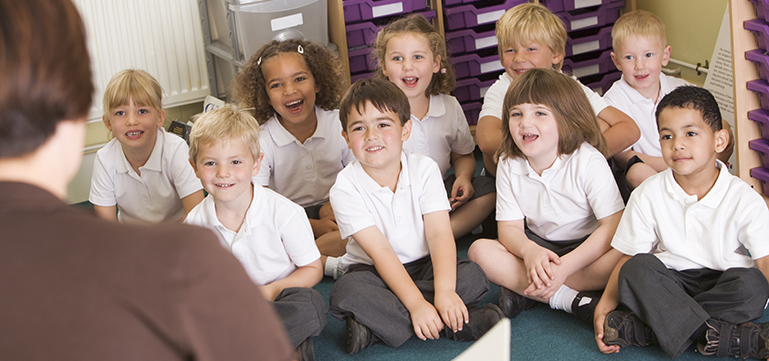Achieving high standards through pupil wellbeing

Quick links:
Context and background to the effective or innovative practice
Craigfelen Primary School is a caring school where all children are happy and well-motivated. They are challenged and achieve high standards through an exciting and enriched curriculum, which prepares pupils for the future. All members of the school community have equal access to learning opportunities and enjoy growing and learning together. The school vision is well summarised by the pupils’ new learning motto:
‘Learning together and having fun, there’s room here for everyone!’ or ‘Pawb yn dysgu gyda’i gilydd ac yn cael hwyl’.
The school also has seven core values, selected by the school council of 2013-2014. They are perseverance, confidence, determination, enthusiasm, commitment, helpfulness and tolerance.
Description of nature of strategy or activity
The school’s opportunities for continual professional development for all staff cover a wide range of areas linked to the school’s priorities. Staff are encouraged to develop their own areas of expertise, for example in entrepreneurial skills, mathematics, outdoor learning, wellbeing and family engagement. The performance management process has evolved over the past few years for both teaching and associate staff. Peer observations and partnerships have been particularly successful.
Teachers work in triads (groups of three) in each phase, with opportunities to focus on areas of the curriculum and teaching and learning strategies. Associate staff work in pairs and have focused on developing questioning skills and written and verbal feedback. The use of peer observations and collaborative working demonstrates the school’s commitment to ensuring that staff have quality time and resources to use shared pedagogical principles to enhance the learning experiences and outcomes of pupils. Shared training sessions are planned termly and focus on the school’s progress against its priorities. Governors are now focused on specific aspects of the school development plan and termly visits, and meetings provide opportunities to shape future direction of the school.
Families are encouraged to become involved in all aspects of school life, in particular through the entrepreneurial projects, which provide exciting and creative approaches to working with families, in order to ensure that skills are developed through working with their children. The school’s pastoral support assistant is also now highly skilled to create vital links with more vulnerable families and her involvement has often broken down barriers, creating trust and openness with families in order to improve their life experiences. The school’s culture of openness to share any issues or concerns, as well as highlighting good practice, and commitment to listen to the views of all are key to the success of this development.
When using external providers, leadership is proactive in seeking quality opportunities for professional learning opportunities and demonstrates a commitment to using quality time to cascade this with all staff, thus empowering the staff who attended the external training. For example, a recently qualified teacher presented attachment awareness strategies during a whole staff training day and the pastoral assistant regularly shares strategies with other teaching assistants who are working with vulnerable children.
What impact has this work had on provision and learners’ standards?
The impact on pupil attainment and achievement has been significant for many pupil groups, including the narrowing of the achievement gap between pupils eligible for free school meals and their peers. The school’s mathematics results for key stage 2 have placed it in the top 25% of similar schools for last five years. Analysis of attendance for the more vulnerable learners, who have engaged in the ‘Team Around the Family’ schools project, has shown an increase for 75% of the pupils involved. Outcomes for these children show that all have achieved expected outcomes, and many have exceeded predicted outcomes. The school’s vision has been particularly successful in improving the engagement levels of parents. Six years ago, very few attended workshops and very little homework was completed. As a result of the school consulting with parents and a deepening understanding of their local community, ‘learning logs’ are now enjoyed at home, with family activities eagerly anticipated. Attendance at termly ‘express events’, where parents come into school to share and celebrate the learning experiences of their children, is now at a record high, with an average 85% attendance for all age groups.
How have you shared your good practice?
The school’s leaders engage proactively in the development of leadership skills for staff, governors and pupils. The deputy headteacher has been seconded to support a local school, and the current acting deputy headteacher has been selected to present at ERW regional consortium training events on areas such as target setting and oracy. The school’s acting foundation phase leader has also developed innovative approaches to the development of the foundation phase profile and tracking of pupil progress. She has also developed highly effective transition arrangements with the Flying Start setting.
The school has developed effective systems of distributive leadership, ensuring that all staff feel valued and contribute to the improvement of learning and teaching approaches. This link shows a video about staff development, which has been shared at the OECD / Welsh Government conference for Schools as Learning Organisations.
The school’s extensive range of pupil voice groups has ensured that pupils of all abilities have had opportunities to ‘grow’ as leaders. Many pupils may have low self-confidence and self-esteem. The school believes that it is vitally important for the development of the next generation that their pupils have the ‘chance to shine’. This link shows a video that has been created by the pupils and shared at the OECD / Welsh Government conference for Schools as Learning Organisations.